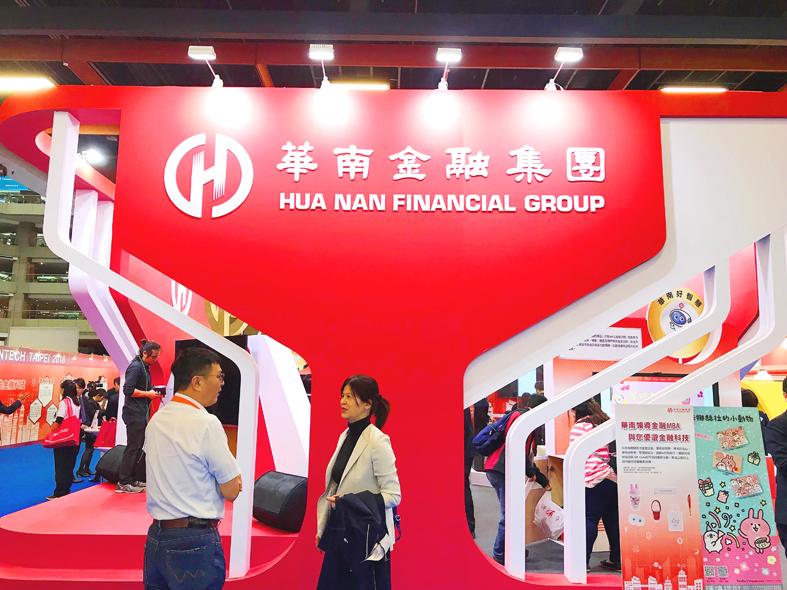State-run Hua Nan Financial Holding Co (華南金控) aims to grow its earnings this year at a pace in line with the nation’s GDP growth, although the COVID-19 pandemic and low interest rates would continue to weigh on its performance, senior officials told a virtual investors’ conference yesterday.
That suggests an improvement of about 5 percent after missing its pre-tax profit target last year by 4 percent mainly due to losses at its securities arm, Hua Nan Securities Co (華南永昌證券) senior vice president and general manager Jully Chu (朱婉麗) said.
The Directorate-General of Budget, Accounting and Statistics last month raised its forecast for the nation’s GDP growth to 4.64 percent this year on surging global demand for technology products.

Photo: Chen Mei-ying, Taipei Times
“We are cautiously optimistic about the economy at home and abroad now that COVID-19 infections have shown signs of easing,” Chu said, adding that the pandemic nevertheless poses great uncertainty, with global central banks maintaining loose monetary policies, which are unfavorable to banking operations.
The interest spread for foreign currency banking tumbled 52 basis points to 1.35 percent last year after the US Federal Reserve cut interest rates to a range of zero to 0.25 percent, Chu said.
Likewise, the maneuvering room for local currency-based lending shed 12 basis points to 1.19 percent after the nation’s central bank lowered the rediscount rate to a record 1.125 percent to ease the financial burden on households, Chu said.
Consequently, net interest margin, a critical profitability gauge for financial institutions, shrank to 1.21 percent for foreign-currency operations and 0.83 percent for local currency loans, she said.
Hua Nan Financial said that it is looking at a flat loanbook this year, while seeking to expand its interest and fee income by growing loans to small and medium-sized enterprises, and in overseas markets, as such businesses generate higher margins.
Main subsidiary Hua Nan Commercial Bank (華南銀行) would actively take part in syndicated loans and strengthen its bancassurance business, the company said, adding that these efforts are intended to boost the interest spread and net interest margin by 4 and 2 basis points respectively this year.
The bank-focused conglomerate is to diversify its sources of income by raising earnings contributions from its stock brokerage, South China Insurance Co (華南產險), and other units, it added.
Asked about its dividend payout plan, Hua Nan Financial said that its net income slumped 48.85 percent to NT$8.66 billion (US$305.73 million) last year, or earnings per share of NT$0.67, down from NT$1.31 a year earlier.
“We will deal with the issue by referring to past practices,” the company said.

COMPETITION: AMD, Intel and Qualcomm are unveiling new laptop and desktop parts in Las Vegas, arguing their technologies provide the best performance for AI workloads Advanced Micro Devices Inc (AMD), the second-biggest maker of computer processors, said its chips are to be used by Dell Technologies Inc for the first time in PCs sold to businesses. The chipmaker unveiled new processors it says would make AMD-based PCs the best at running artificial intelligence (AI) software. Dell has decided to use the chips in some of its computers aimed at business customers, AMD executives said at CES in Las Vegas on Monday. Dell’s embrace of AMD for corporate PCs — it already uses the chipmaker for consumer devices — is another blow for Intel Corp as the company

STIMULUS PLANS: An official said that China would increase funding from special treasury bonds and expand another program focused on key strategic sectors China is to sharply increase funding from ultra-long treasury bonds this year to spur business investment and consumer-boosting initiatives, a state planner official told a news conference yesterday, as Beijing cranks up fiscal stimulus to revitalize its faltering economy. Special treasury bonds would be used to fund large-scale equipment upgrades and consumer goods trade-ins, said Yuan Da (袁達), deputy secretary-general of the Chinese National Development and Reform Commission. “The size of ultra-long special government bond funds will be sharply increased this year to intensify and expand the implementation of the two new initiatives,” Yuan said. Under the program launched last year, consumers can

TECH PULL: Electronics heavyweights also attracted strong buying ahead of the CES, analysts said. Meanwhile, Asian markets were mixed amid Trump’s incoming presidency Taiwan Semiconductor Manufacturing Co (TSMC, 台積電) shares yesterday closed at a new high in the wake of a rally among tech stocks on Wall Street on Friday, moving the TAIEX sharply higher by more than 600 points. TSMC, the most heavily weighted stock in the TAIEX, rose 4.65 percent to close at a new high of NT$1,125, boosting its market value to NT$29.17 trillion (US$888 billion) and contributing about 400 points to the TAIEX’s rise. The TAIEX ended up 639.41 points, or 2.79 percent, at 23,547.71. Turnover totaled NT$406.478 billion, Taiwan Stock Exchange data showed. The surge in TSMC follows a positive performance

FUTURE TECH: Nvidia CEO Jensen Huang would give the keynote speech at this year’s Consumer Electronics Show, which is also expected to highlight autonomous vehicles Gadgets, robots and vehicles imbued with artificial intelligence (AI) would once again vie for attention at the Consumer Electronics Show (CES) this week, as vendors behind the scenes would seek ways to deal with tariffs threatened by US president-elect Donald Trump. The annual Consumer Electronics Show opens formally in Las Vegas tomorrow, but preceding days are packed with product announcements. AI would be a major theme of the show, along with autonomous vehicles ranging from tractors and boats to lawn mowers and golf club trollies. “Everybody is going to be talking about AI,” Creative Strategies Inc analyst Carolina Milanesi said. “From fridges to ovens